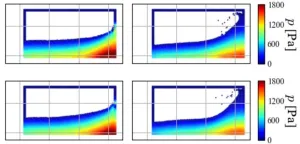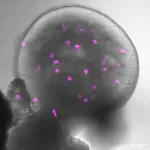(Press-News.org) For patients with polycystic kidney disease (PKD), a common genetic disorder that ravages the waste-removing organ with cysts, dialysis and transplantation are among the only treatments.
More than 12.4 million people worldwide suffer from the dominant form of the condition. Now, Rutgers University geneticists have uncovered fresh details of how the disease progresses – findings that could open the door to new therapies.
In a study published in Nature Communications, Inna Nikonorova, a research assistant professor in the Department of Genetics within the Rutgers School of Arts and Sciences, reports on a novel way to identify and track material carried by extracellular vesicles (EVs) – sub-microscopic communication tools shed by cells that play a key role in the development of cancers, neurodegeneration and renal diseases such as PKD.
“Inna was able to identify the other proteins that travel with polycystic proteins inside EVs, proteins that no one really knew about before,” said Maureen Barr, a distinguished professor of genetics at Rutgers University-New Brunswick, and a co-author of the study. “For researchers in the PKD field, this is very exciting.”
Once considered a waste product of cells, researchers now understand the health implications of extracellular vesicles.
“Beneficial cargo within these transporters – proteins, for instance – aid in wound healing and tissue regeneration,” Nikonorova said. “But they can also function diabolically to spread toxic cargoes and act as disease mediators.”
What has been unclear is how cargoes are selected and packaged into extracellular vesicles.
To explore this mystery, Nikonorova and Barr zeroed in on an EV that carries PKD gene proteins and associated material. Changes to PKD proteins called polycystins are linked to disease progression.
Using findings from a previous study, Nikonorova developed a labeling tool to track the cargo of specialized EVs in a laboratory worm called C. elegans, which has a translucent body and rapid growth cycle. By deploying a green fluorescent protein that binds to polycystin-2, Nikonorova was able to watch the EV cargo travel through the body of the worm and map its interactions.
“Wherever the polycystins travel, you see a green light under the microscope,” she said. “It’s like giving someone a flashlight and watching them go room to room through a dark house.”
The tracking method Nikonorova used, known as “proximity labeling,” helped her determine the precise mechanism by which polycystins are packaged into EVs and the associated proteins that polycystins travel with throughout the body.
“We went beyond identification,” Nikonorova said.
Past studies have only named the proteins within EVs. By contrast, “We took each candidate and looked at whether it goes to vesicles with polycystins and interacts with them,” she said.
This information could help researchers understand what is happening within cells with missing polycystin proteins, essential knowledge for finding ways to cure polycystic kidney disease or slow its progression, Nikonorova said.
This research was supported by grants from the National Institutes of Health.
END
How researchers are shining a light on kidney disease
The Rutgers-led discovery of an innovative cellular tracking tool could yield new therapies for a common genetic renal disorder
2025-04-03
ELSE PRESS RELEASES FROM THIS DATE:
Some gut bacteria could make certain drugs less effective
2025-04-03
A new study, published today in Nature Chemistry by researchers from the University of Pittsburgh and Yale University, shows how common gut bacteria can metabolize certain oral medications that target cellular receptors called GPCRs, potentially rendering these important drugs less effective.
Drugs that act on GPCRs, or G protein-coupled receptors, include more than 400 medications approved by the U.S. Food and Drug Administration (FDA) for treatment of many common conditions such as migraines, depression, type 2 diabetes, prostate cancer and more.
“Understanding how GPCR-targeted drugs interact with human gut microbiota is critical for advancing ...
PEPITEM sequence shows effects in psoriasis, comparable to steroid cream
2025-04-03
Birmingham scientists have shown that a sequence of just three amino acids may reduce the severity of psoriasis, when applied topically in an emollient cream.
The researchers, whose study is published in Pharmacological Research, identified the smallest part of a peptide (small protein) called PEPITEM, which occurs naturally in the body and regulates inflammation.
The study also showed that both PEPITEM and the three amino acid (tripeptide) sequence delivered a significant reduction in the severity of psoriasis, that is comparable to a steroid cream.
Psoriasis ...
Older teens who start vaping post-high school risk rapid progress to frequent use
2025-04-03
A new study has found that young vapers in the United States who begin using e-cigarettes after graduating from secondary/high school are likely to progress rapidly to frequent use. While US youths who start vaping during secondary/high school typically take about three years to progress to frequent use, this newly identified group of young adults who start vaping a bit later, after graduation (mean age = 20 years), tend to reach frequent use in about one year. ‘Frequent use’ is defined as using e-cigarettes on 20 or ...
Corpse flowers are threatened by spotty recordkeeping
2025-04-03
Commonly called the “corpse flower,” Amorphophallus titanum is endangered for many reasons, including habitat destruction, climate change and encroachment from invasive species.
Now, plant biologists from Northwestern University and the Chicago Botanic Garden have added a new threat to the list: incomplete historical records.
In a new study, scientists constructed the ancestry of corpse flowers living in collections at institutions and gardens around the world. They found a severe lack of consistent, standardized data. Without complete historical records, conservationists were unable to make informed decisions ...
Riding the AI wave toward rapid, precise ocean simulations
2025-04-03
AI has created a sea change in society; now, it is setting its sights on the sea itself.
Researchers at Osaka Metropolitan University have developed a machine learning-powered fluid simulation model that significantly reduces computation time without compromising accuracy. Their fast and precise technique opens up potential applications in offshore power generation, ship design and real-time ocean monitoring.
Accurately predicting fluid behavior is crucial for industries relying on wave and tidal energy, as well as for design of maritime structures and vessels. ...
Are lifetimes of big appliances really shrinking?
2025-04-03
Big appliances, like washing machines, ovens and refrigerators, are a major investment for many households. Consumers hope that these appliances will last for decades. More and more, however, people have the perception that these big-ticket items might not be lasting as long as they once did.
But when Kamila Krych looked at actual trends in product lifetimes as a part of her PhD research at the Norwegian University of Science and Technology's (NTNU) Industrial Ecology Programme, she found that wasn’t quite true.
“Despite what people think, there is no evidence that product lifetimes are decreasing,” she said. “Many people think that products have been becoming ...
Pink skies
2025-04-03
Organoids have revolutionized science and medicine, providing platforms for disease modeling, drug testing, and understanding developmental processes. While not exact replicas of human organs, they offer significant insights. The Siegert group at the Institute of Science and Technology Austria (ISTA) presents a new organoid model that reveals details of the developing nervous system’s response to viral infections, such as Rubella. This model could influence pharmaceutical testing, particularly benefiting drug safety for pregnant ...
Monkeys are world’s best yodellers - new research
2025-04-02
A new study has found that the world’s finest yodellers aren’t from Austria or Switzerland, but the rainforests of Latin America.
Published in the journal Philosophical Transactions of the Royal Society B and led by experts from Anglia Ruskin University (ARU) and the University of Vienna, the research provides significant new insights into the diverse vocal sounds of non-human primates, and reveals for the first time how certain calls are produced.
Apes and monkeys possess special anatomical structures in their throats called vocal membranes, which disappeared from humans through evolution to allow for more stable speech. However, ...
Key differences between visual- and memory-led Alzheimer’s discovered
2025-04-02
Differences in the distribution of certain proteins and markers in the brain may explain why some people first experience vision changes instead of memory loss in Alzheimer’s disease, finds a new study by UCL researchers.
Posterior cortical atrophy (PCA) is a rare form of Alzheimer’s disease that, rather than causing problems with memory, leads to difficulties with reading, navigating, and recognising objects. Studies suggest that one in 10 patients with Alzheimer’s disease have a form which is visual, rather than memory led.
As well as presenting with unusual symptoms, ...
% weight loss targets in obesity management – is this the wrong objective?
2025-04-02
New research to be presented at this year’s European Congress on Obesity (ECO 2025, Malaga, Spain, 11-14 May) suggests that weight loss programmes targeting a particular % weight loss are often failing, and that other factors should be considered including improvement of obesity-related complications, enhancing quality of life and overall physical and social functioning. The research is by an international team including Dr Sanjeev Sockalingam, Obesity Canada and the Centre for Addiction and Mental Health, Toronto, Ontario, Canada, and colleagues.
Identifying the most appropriate targets for obesity management is crucial due to the complexity of obesity ...
LAST 30 PRESS RELEASES:
Spiritual practices strongly associated with reduced risk for hazardous alcohol and drug use
Novel vaccine protects against C. diff disease and recurrence
An “electrical” circadian clock balances growth between shoots and roots
Largest study of rare skin cancer in Mexican patients shows its more complex than previously thought
Colonists dredged away Sydney’s natural oyster reefs. Now science knows how best to restore them.
Joint and independent associations of gestational diabetes and depression with childhood obesity
Spirituality and harmful or hazardous alcohol and other drug use
New plastic material could solve energy storage challenge, researchers report
Mapping protein production in brain cells yields new insights for brain disease
Exposing a hidden anchor for HIV replication
Can Europe be climate-neutral by 2050? New monitor tracks the pace of the energy transition
Major heart attack study reveals ‘survival paradox’: Frail men at higher risk of death than women despite better treatment
Medicare patients get different stroke care depending on plan, analysis reveals
Polyploidy-induced senescence may drive aging, tissue repair, and cancer risk
Study shows that treating patients with lifestyle medicine may help reduce clinician burnout
Experimental and numerical framework for acoustic streaming prediction in mid-air phased arrays
Ancestral motif enables broad DNA binding by NIN, a master regulator of rhizobial symbiosis
Macrophage immune cells need constant reminders to retain memories of prior infections
Ultra-endurance running may accelerate aging and breakdown of red blood cells
Ancient mind-body practice proven to lower blood pressure in clinical trial
SwRI to create advanced Product Lifecycle Management system for the Air Force
Natural selection operates on multiple levels, comprehensive review of scientific studies shows
Developing a national research program on liquid metals for fusion
AI-powered ECG could help guide lifelong heart monitoring for patients with repaired tetralogy of fallot
Global shark bites return to average in 2025, with a smaller proportion in the United States
Millions are unaware of heart risks that don’t start in the heart
What freezing plants in blocks of ice can tell us about the future of Svalbard’s plant communities
A new vascularized tissueoid-on-a-chip model for liver regeneration and transplant rejection
Augmented reality menus may help restaurants attract more customers, improve brand perceptions
Power grids to epidemics: study shows small patterns trigger systemic failures
[Press-News.org] How researchers are shining a light on kidney diseaseThe Rutgers-led discovery of an innovative cellular tracking tool could yield new therapies for a common genetic renal disorder




